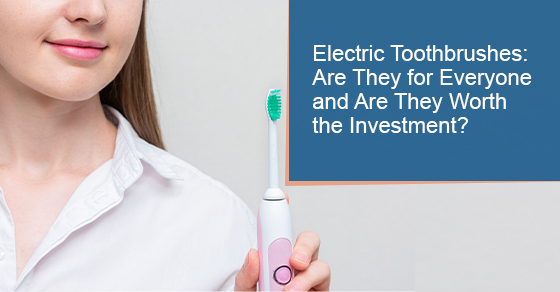There are dozens of types of toothbrushes on the market today, which can make toothbrush shopping a lot more complicated than it needs to be. This goes for both manual and electric toothbrushes; so, which should you choose? Also, are power brushes really worth the extra money? Today, we’ll answer all of your pressing questions about the mighty electric toothbrush.
Manual Brushes: Out with the Old, In With the New
Is there something wrong with using a good old manual brush? The short answer is no. Humans have been brushing manually for ages, and it is still possible to effectively brush your teeth using one today. So, why reinvent the wheel if the wheel still works? Well, technology pushes us to innovate and constantly drives us forward using better materials and designs that help us accomplish things more conveniently. In this case, brushing our teeth and gums properly.
It’s not a question of whether or not manual brushes are useful or effective at brushing our teeth, but rather, are we using them properly? With the proper technique and routine, manual toothbrushes and floss are perfectly fine to help prevent tooth decay and gum disease. However, many of us make the mistake of not brushing for long enough or not using the proper technique to clean our teeth and gums properly.
The Benefits of an Electric Toothbrush
Electric toothbrushes are able to clean at up to 30,000 strokes per minute compared to manual brushes that can only produce up to 200 strokes. The more strokes, the more plaque removed, the better. This fact can be a pretty convincing one if you are on the fence about the usefulness of an electric toothbrush.
In addition, electric toothbrushes can reduce 21% more plaque and 11% more gingivitis after three months of use. Plus, many electric toothbrushes have a 2-minute timer built in to let you know when you have brushed your teeth for long enough.
Electric toothbrushes help to stimulate the blood flow in your gums, which helps keep them healthy and less likely to bleed or become swollen after brushing or flossing.
Your Dentist and Hygienist Will Notice the Difference
Your hygienist will definitely notice the change in your oral care routine, as there is a big difference between those patients who use an electric toothbrush and those who don’t. Oral hygienists and dentists alike recommend using electric toothbrushes for many of the benefits that they see in their patients who do use them.
Is the cost worth it?
The cost might be a big factor in stopping you from getting an electric toothbrush, so will it be a worthwhile investment for you? In the long run, if using an electric toothbrush means you will brush your teeth more and for longer, that means you are less likely to get cavities or gum disease, which are big expenses. This means that the lifetime value of your electric brush will be worthwhile in the end.
If you are an expert at brushing and flossing using the best technique, and you have never had issues with cavities, tooth decay, or gum disease, then you are most likely fine. However, if you’re like a majority of us, then going with an electric toothbrush is the best option.
Who will benefit the most from using an electric toothbrush?
Electric toothbrushes can be helpful for certain groups of people, like those who have trouble using their hands or who have poor hand-to-eye coordination. Electric toothbrushes can also help children make brushing their teeth more fun, while also helping them clean their teeth properly. People who have braces will also be able to clean in and around the metal parts of their braces more easily using an electric toothbrush. Lastly, lazy brushers might have electric toothbrushes recommended to them by their dentist.
There are some cons that come with getting an electric toothbrush. For one, you need to keep in mind that once you purchase your electric toothbrush, the expenses do not stop there. You will need to keep buying replaceable brush heads for it as often as you would switch out your manual toothbrush for a new one. Using an electric toothbrush might also lead you to believe you are brushing better, but without the right habits and amount of time, this might be a false sense of accomplishment. Electric brushes also tend to be heavier and bulkier, which can make bringing them along with you while travelling more difficult.
These are all things that you should consider when deciding between a manual and electric toothbrush. If you’re still not sure which one would be best for you, then you can ask your dentist the next time you see them.
For more information about dental services in Toronto, call Bloor West Smiles at 416-766-2853 or contact us here.


Sorry, comments are closed for this post.